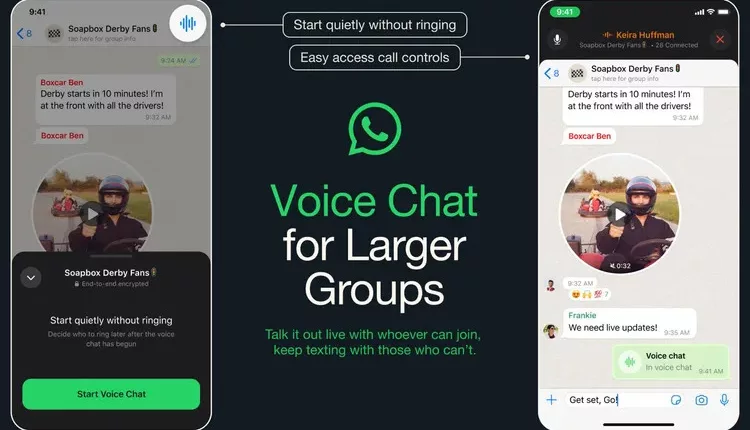WhatsApp is now taking a page out of Discord’s book to roll out a new voice chat feature to its users. According to the Meta-owned messaging service, this new addition will offer a less disruptive and more seamless experience for users engaged in large group voice discussions. This feature was earlier spotted to be released in beta.
WhatsApp’s upcoming voice chat feature introduces a discreet initiation process, where participants receive a silent push notification and can join the audio room via an in-chat bubble. This marks a departure from traditional ringing mechanisms and WhatsApp’s current practice regarding voice calls and voice notes – the new feature does not ring each group member individually when a voice chat is started. Beyond personal use, the new voice chat feature could impact the dynamics of business and social interactions within WhatsApp. It opens avenues for more collaborative discussions, team interactions, and social engagements within the app, potentially influencing how businesses and communities leverage WhatsApp for communication.
Once a voice chat is underway, WhatsApp ensures that users have efficient control mechanisms. Call controls, positioned at the top of the chat, provide a non-intrusive way for participants to manage their voice interaction without hindering their ability to send text messages concurrently. WhatsApp’s voice chats are also equipped with end-to-end encryption to preserve user privacy. If you are not a member of the voice chat in the group, then you will be able to see the profiles of other users who are in the voice chat directly from the chat header and the Calls tab. The voice chats will end once everyone has left the chat, or no one joins the first or last person in the chat for 60 minutes.
A standout feature of WhatsApp’s voice chat is its support for multitasking. Participants can effortlessly control the call while simultaneously sending text messages. The easily accessible call controls at the top of the group chat provide users with unparalleled flexibility, enhancing the overall user experience. WhatsApp’s voice chat feature is slated for a global rollout on both iOS and Android platforms in the coming weeks, according to media reports. As this feature gains momentum, it opens doors for future integrations and refinements. Meta CEO Mark Zuckerberg’s vision of WhatsApp as the “private social platform of the future” seems to be manifesting through these new features.
WhatsApp’s phased rollout strategy begins with larger group chats, accommodating between 33 and 128 participants. This targeted approach ensures that the benefits of the voice chat feature are maximized where group dynamics are more complex. Smaller groups, with fewer than 33 members, can continue leveraging WhatsApp’s existing group voice call functionality. Initiating a voice chat on WhatsApp is designed to be a user-friendly process. In order to do so, users need to open the desired group chat, tap the phone icon in the top right corner, and select “Start Voice Chat.” The push notification system then invites group members to join, facilitating a smooth transition into voice conversations.
